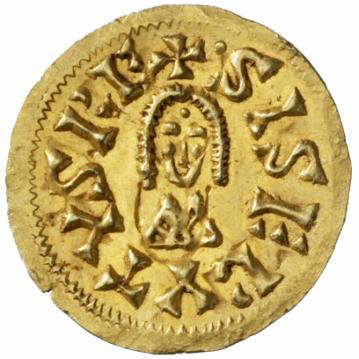Sisebur on:
[Wikipedia]
[Google]
[Amazon]

 Sisebut ( la, Sisebutus, es, Sisebuto; also ''Sisebuth'', ''Sisebur'', ''Sisebod'' or ''Sigebut'') ( 565 – February 621) was
Sisebut ( la, Sisebutus, es, Sisebuto; also ''Sisebuth'', ''Sisebur'', ''Sisebod'' or ''Sigebut'') ( 565 – February 621) was

 Sisebut ( la, Sisebutus, es, Sisebuto; also ''Sisebuth'', ''Sisebur'', ''Sisebod'' or ''Sigebut'') ( 565 – February 621) was
Sisebut ( la, Sisebutus, es, Sisebuto; also ''Sisebuth'', ''Sisebur'', ''Sisebod'' or ''Sigebut'') ( 565 – February 621) was King of the Visigoths
The Visigothic Kingdom, officially the Kingdom of the Goths ( la, Regnum Gothorum), was a kingdom that occupied what is now southwestern France and the Iberian Peninsula from the 5th to the 8th centuries. One of the Germanic successor states ...
and ruler of Hispania
Hispania ( la, Hispānia , ; nearly identically pronounced in Spanish, Portuguese, Catalan, and Italian) was the Roman name for the Iberian Peninsula and its provinces. Under the Roman Republic, Hispania was divided into two provinces: Hisp ...
and Septimania from 612 until his death.
Biography
He campaigned successfully against the remains ofEast Roman
The Byzantine Empire, also referred to as the Eastern Roman Empire or Byzantium, was the continuation of the Roman Empire primarily in its eastern provinces during Late Antiquity and the Middle Ages, when its capital city was Constantinopl ...
power in Spania
Spania ( la, Provincia Spaniae) was a province of the Eastern Roman Empire from 552 until 624 in the south of the Iberian Peninsula and the Balearic Islands. It was established by the Emperor Justinian I in an effort to restore the western prov ...
,Roger Collins, ''Visigothic Spain 409-711'' (Blackwell Publishing, 2004), 75. strengthened Visigothic control over the Basques and Cantabri
The Cantabri ( grc-gre, Καντάβροι, ''Kantabroi'') or Ancient Cantabrians, were a pre-Roman people and large tribal federation that lived in the northern coastal region of ancient Iberia in the second half of the first millennium BC. Thes ...
ans, developed friendly relations with the Lombards
The Lombards () or Langobards ( la, Langobardi) were a Germanic people who ruled most of the Italian Peninsula from 568 to 774.
The medieval Lombard historian Paul the Deacon wrote in the '' History of the Lombards'' (written between 787 an ...
of Italy
Italy ( it, Italia ), officially the Italian Republic, ) or the Republic of Italy, is a country in Southern Europe. It is located in the middle of the Mediterranean Sea, and its territory largely coincides with the homonymous geographical ...
, and reinforced the fleet which had been established by his predecessor Leovigild
Liuvigild, Leuvigild, Leovigild, or ''Leovigildo'' (Spanish and Portuguese), ( 519 – 586) was a Visigothic King of Hispania and Septimania from 568 to 586. Known for his Codex Revisus or Code of Leovigild, a law allowing equal rights between th ...
.
Sisebut was known for his devout piety to Chalcedonian Christianity
Chalcedonian Christianity is the branch of Christianity that accepts and upholds theological and ecclesiological resolutions of the Council of Chalcedon, the Fourth Ecumenical Council, held in 451. Chalcedonian Christianity accepts the Christol ...
. In 612, upon his accession to the throne, he forced his Jewish
Jews ( he, יְהוּדִים, , ) or Jewish people are an ethnoreligious group and nation originating from the Israelites Israelite origins and kingdom: "The first act in the long drama of Jewish history is the age of the Israelites""The ...
subjects to convert to Christianity
Christianity is an Abrahamic monotheistic religion based on the life and teachings of Jesus of Nazareth. It is the world's largest and most widespread religion with roughly 2.38 billion followers representing one-third of the global pop ...
. In 616, he ordered that those Jews who refused to convert to Christianity be punished with the lash. He was closely associated and amicable with the scholar and encyclopaedist Isidore
Isidore ( ; also spelled Isador, Isadore and Isidor) is an English and French masculine given name. The name is derived from the Greek name ''Isídōros'' (Ἰσίδωρος) and can literally be translated to "gift of Isis." The name has survived ...
, bishop of Seville
Seville (; es, Sevilla, ) is the capital and largest city of the Spanish autonomous community of Andalusia and the province of Seville. It is situated on the lower reaches of the River Guadalquivir, in the southwest of the Iberian Peninsula ...
, and is usually regarded as the author of a Latin poem on astronomy, ''Carmen de Luna'' or ''Praefatio de Libro Rotarum'', dedicated to a friend who is identified with Isidore.
He had a son, who succeeded him as Reccared II
Reccared II (in Spanish, Galician and Portuguese, ''Recaredo''), (? – March 621) was Visigothic King of Hispania, Septimania and Galicia briefly in 621, though the length of the reign exactly is debated to last from several days to just over ...
.Roger Collins, ''Visigothic Spain 409-711'', 76.
References
{{Authority control 7th-century Visigothic monarchs Medieval Portugal 621 deaths Year of birth uncertain 7th-century poets 7th-century Latin writers 7th-century astronomers